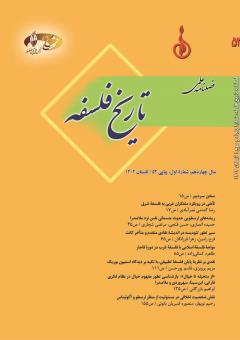سیر تطور تئودیسه در اندیشۀ نقادی متقدم و متأخر کانت
محورهای موضوعی : ریشهشناسی مکاتب و آراء فلسفی در ادوار قدیم و جدید
فرح رامین
1
*
![]() ,
زهرا فرزانگان
2
,
زهرا فرزانگان
2
![]()
1 - استاد گروه فلسفه و کلام اسلامی، دانشگاه قم، قم، ایران
2 - دانش آموختۀ دکتری فلسفه و کلام اسلامی، دانشگاه قم، قم، ایران
کلید واژه: مسئلۀ شر, شر بنیادی, شر رادیکال, نظام احسن, تئودیسه, دورۀ نقادی متقدم, دورۀ نقادی متأخر, کانت,
چکیده مقاله :
حیات علمی کانت، با یک نگاه کلی، به دو دورۀ پیشانقدی و نقادی تقسیم میشود. برخی محققان با دقت نظر بیشتری به بررسی سیر تاریخی تحول و تکامل اندیشه¬های کانت پرداخته و دورۀ نقادی را نیز به دو بخش تقسیم کرده¬اند. تبیین دیدگاه کانت در مسئلۀ شر ـ با توجه به تفاوت نگاه ظریفی که در آثار منتشر شده از وی در اوایل دورۀ نقادی و اواخر آن بچشم میخوردـ سیر شکلگیری ساختار فکری وی در اینباره را بتصویر میکشد. مطالعات صورتگرفته در این زمینه، فاصلهگرفتن تدریجی کانت از معرفت نظری نسبت به خدا و بالتبع، پاسخ کلامی به مسئلۀ شر را نشان میدهد، که در اواخر دورۀ نقادی به اوج میرسد. اصل «آزادی» که از اصول موضوعۀ اخلاق در اندیشههای نقادی کانت است، محور اصلی توجیه شرّ اخلاقی در آثار او، بویژه در دورۀ نقادی متأخر است. نوشتار پیشرو با شیوۀ توصیفیـتحلیلی، به بررسی دیدگاه کانت در مورد مسئلۀ شر در دو دورۀ نقادی میپردازد. کانت در اوایل دورۀ نقد، نظریۀ «بهترین جهان ممکن» را تأیید کرده، اگرچه در این نظریه، مفهوم «کمال» با مفهوم «واقعیت» یکسان پنداشته شده است، اما او در اواخر دورۀ نقد، از تعریف رایج «خیر و شر» فاصله گرفته و با انکار شایستگی تئودیسه¬های فلسفی، پاسخی جدید برای معضل شرور ارائه میدهد. کانت در دورۀ نقادی، شر را ذاتی بشر دانسته و تفسیر سنتی و رواقی از منشأ زمانی و عقلی شر در طبیعت انسان را نفی مینماید.
Generally speaking, Kant’s academic life is divided into two pre-critical and post-critical periods. Some researchers have explored the historical development and evolution of his philosophical thoughts and divided the critical period into two parts as well. An explanation of Kant’s view of the problem of evil, given the difference in the subtle view that is witnessed in his works published in the early and late critical period, portrays the process of the formation of his philosophical structure in this regard. Related studies in this field reveal his gradual distance from the theoretical knowledge of God and, thus, his theological response to the problem of evil, which reached its culmination towards the end of the critical period. The principle of “freedom”, which is one of the postulates of ethics in Kant’s critical thoughts, is the axis of the justification of moral evil in his works, particularly during the later critical period. Following a descriptive-analytic method, the present study investigates Kant’s view of the problem of evil during two critical periods. In the early critical period, he confirmed the theory of the “best possible world”, while equating the concept of “perfection” with the concept of “reality” therein. However, in the late critical period, he moves away from the common definition of “evil and good” and presents a new response to the dilemma of evil through denying the legitimacy of philosophical theodicies. During the critical period, Kant viewed evil as an essential feature of Man and denied the traditional and Stoic interpretation of the temporal and rational origins of evil in human nature.
زوپانچیچ، آلنکا (1396) اخلاقیات امر واقعی: کانت، لاکان، ترجمه علی حسن¬زاده، تهران: آگاه.
کاپلستون، فردریک چارلز (1400) تاریخ فلسفه، ج1، ترجمه جلالالدین مجتبوی، تهران: علمی و فرهنگی.
کانت، ایمانوئل (1397) «درباب ناکامی تمام آزمونهای فلسفی در تئودیسه»، ترجمۀ سیدمحمدحسین صالحی، در دربارۀ شر، ج1، تهران: طه.
کانت، ایمانوئل (1399) درسهای فلسفه اخلاق، ترجمۀ منوچهر صانعی درهبیدی، تهران: نقش و نگار.
کانت، ایمانوئل (1394) دین در محدوده عقل تنها، ترجمۀ منوچهر صانعی درهبیدی، تهران: نقش و نگار.
کانت، ایمانوئل (1395) نقد عقل عملی، ترجمۀ انشاءالله رحمتی، تهران: سوفیا.
هوفه، اوتفرید (1392) قانون اخلاقی در درون من، ترجمۀ رضا مصیبی، تهران: نی.
Bernstein, R. J. (2007). Radical Evil. Cambridge: Polity press.
Huxford, G. (2020). Kant and theodicy. London: Lexington books.
Kant, I. (1978). Lectures on philosophical theology. New York: Cornell University press.
Kant, I. (1992). An attempt at some reflections on Optimism. Cambridge: Cambridge University Press.
Kant, I. (2001). Lectures on the philosophical doctrine of religion. Cambridge: Cambridge University Press.
Kant, I. (2007a). Conjectural beginning of human history. Cambridge: Cambridge University Press.
Kant, I. (2007b). Idea for a universal history with a cosmopolitan aim. Cambridge: Cambridge University Press.
Krishnan, M. (2021). Kant’s critical theory of the best possible world. Kantian Review, vol. 26, no. 1, pp. 27-51.
Leibniz, G. W. (2005). Theodicy. trans. by E. M. Huggard. Released online by the project Gutenberg [originally published in 1951 by Routledge & Kegan Paul Limited, London].
Louden, R. B. (2011). Kant’s human being. Oxford: Oxford University Press.

